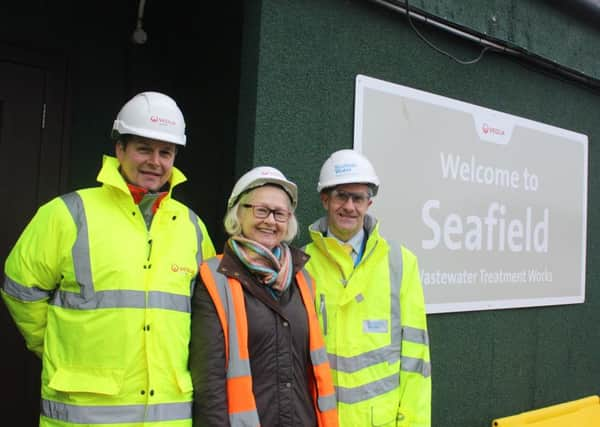Christine De Luca's '˜Gardyloo' pay tribute to sewerage workers


But now the Edinburgh Makar, Christine De Luca, has turned her attention to writing and commissioning “Edinburgh’s Unsung” – a host of poems celebrating people such as chimney sweeps, refuse collectors, lollipop men and ladies, street lighting workers, civic clockwinders, gas workers, night bus drivers, soup kitchen workers, book dusters at the National Library and volunteers running soup kitchens for the homeless.
And that’s to name but a few.
The first poem in the collection – Gardyloo, about the Seafield Waste Water Plant – is published below.
Advertisement
Hide AdAdvertisement
Hide AdThe other two-dozen poems by writers such as Hamish Whyte and Ian McDonough will be posted on the Makar’s blog www.edinburghmakar.org.uk in late May.
De Luca has achieved huge acclaim with works such as The Morning After, about the need for reconciliation after the Scottish independence referendum, and another about the statue of 18th-century Scottish economist Adam Smith in the Royal Mile and what Smith would think of today’s economy.
The Makar said: “I’ve written about the great and the good and so many other subjects over the years but I believe there is an equal place for celebrating the people we take for granted.
“I’m very aware a city can’t prosper without all the hidden work to keep the place clean, safe, pleasant and functioning. So I have set up Edinburgh’s Unsung, to enthuse other city poets to join me in writing poems to create a small poetic token of appreciation for those relatively unseen people we tend to take for granted but who help make any city – even a literary city – function smoothly and its citizens feel a sense of communal pride, to strengthen links between literature and everyday life.
Advertisement
Hide AdAdvertisement
Hide Ad“I’m looking forward to sharing the poems with the readers of the Evening News.”
Mark Keast, Seafield general manager, said staff were delighted with the result.
“It was great to have Christine recognise the work undertaken by the site and produce something capturing the process so well,” he said.
“It was wonderful how she started with the tumultuous, hectic process and then ended with a tranquil scene.”
Advertisement
Hide AdAdvertisement
Hide AdColin Waters, communications manager at the Scottish Poetry Library, said: “The late great poet Adrian Mitchell once wrote, ‘Most people ignore most poetry because most poetry ignores most people’.
“De Luca’s latest project eloquently overturns Mitchell’s argument. By commissioning a squad of poets to write about the sort of jobs that are essential to maintaining modern life but which we rarely think about, she is making an argument for poetry as the voice of the voiceless.”
Gardyloo
There’s no MV Gardyloo now, gently relieving herself
of Edinburgh’s sewage in the Firth of Forth, that day trip
for hardy birders. She’s more than been replaced:
six digesters which, from the sea, blend into Arthur’s Seat.
Seagulls are winging in from the firth, taking a dip
in the settlement tanks. From the metal stairs above
you can see beyond the catchment, across Inchkeith
to the Lomonds, beyond Almond and Esk. It’s said
sunrise is stunning if you’re on summer night-shift.
Never locked up and left, yet hardly a soul to be seen.
What seems like a space-station of engines, pipework,
pumps gets on with the daily business. Seven screens
in the control-room keep up a stream of information:
that outlet, this sluice, that consistency, this flow rate,
that temperature, this sewer, that wind direction;
it’s all monitored, someone always on the bridge.
It’s hard to believe that the waste from almost a million
of us flows as sweetly as it does up the massive
Archimedes screw, passes through ever finer screens,
makes something clean and degradable from all the
paper clutter, removes the occasional shopping trolley.
Then it rests as grit to be pumped out settles in the sump.
Seagulls relax, make a long pearl necklace of a pipe, keep
a cold eye on pigeons that flap about the skips, nicking
pickings from that sifted grit waiting to be recycled.
Then on it hurtles at thousands of litres per second
to settle and separate: sludge ever thickening, ever
purifying; and the captured methane, a virtuous cycle
powering the process with energy to spare; lorries snatch
the digested residue that will nourish next year’s crops.
And all this time the effluent has streamed on, aerated
so those bugs can get to work to clean it up. In summer
the biggest set of UV lights in Europe zaps the nasties
that might still lurk, the salmonella. Listen, it has
the speed and sparkle of a Highland burn in spate.
SEPA checks we could fill a kettle, dilute a dram at the
Advertisement
Hide AdAdvertisement
Hide Adrushing outlet piped far into the shining Forth. But still
we turn on taps, endlessly shower. Design, maintenance,
monitoring, improving process: they’re never done.
For that we should be grateful each time we flush.